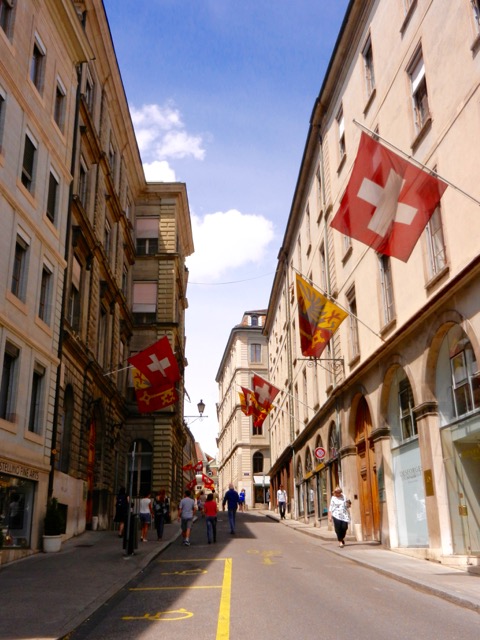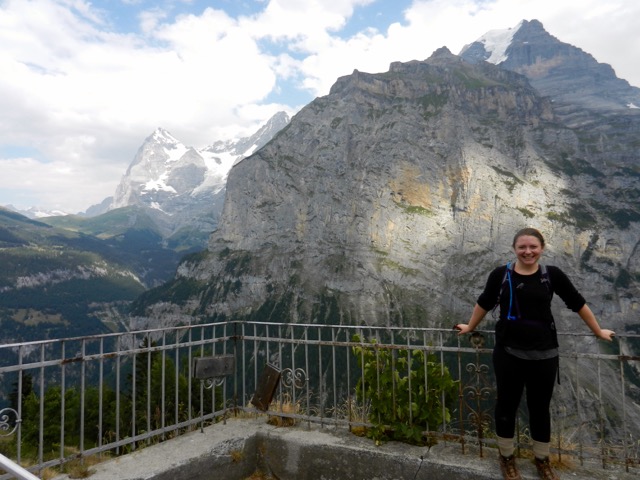Britnae Purdy, Past SSH Blog Correspondent and Anti-Street Harassment Week Manager

This past summer, at age 23, I experienced complete freedom of movement for the first time. I have been driving for eight years, living out of the family home for six – but because I am a woman my ability to move freely though the world on my own time schedule is often limited by either overt threats or an internalized sense of fear. You’ve heard them – get home before dark. Don’t wear that skirt downtown. Text a friend when you arrive home so they know you’re safe. Don’t walk alone. Not exactly conducive to a busy schedule.
I didn’t entirely know what to expect when I moved to Switzerland to pursue an internship opportunity at the World Health Organization. I applied on a whim – I was newly graduated and terminally unemployed. In no realm of reality did I expect to actually land it, and when I did I surprised myself even more by accepting immediately. The next couple weeks were a tizzy of navigating the visa system, booking flights, finding housing, and shoving as much French into my brain as I could.
I was nervous the entire time. Could I actually do this? Was it safe? All the travel materials I read assured me that Geneva was a safe place – but of course, my US hometown is supposed to be as well. In today’s world, safety seems more and more subjective. I’m not a daring person – why on earth would I think I could do this?
The first time I rode public transportation in Geneva, two days after arriving, was to a work function that ended up keeping me out long past dark. I was literally shaking the entire ride home, though the city’s busiest stops, where I briefly got lost switching lines, and to my apartment on the far, far side of town. I would never do this on the Washington DC Metro.
Not a single person bothered me that night. Nor the next night. In fact, throughout the three months I spent in Geneva I was not verbally or physically harassed once.
Slowly, I realized that the fears I learned in the United States were not necessarily universal. In the US, and indeed many places of the world, public spaces are often not welcoming of certain genders, races, and other identities. It’s difficult to reconcile this against the image of America that I love and am proud of – but undoubtedly, some of these fears and experiences had become ingrained in my mind.
My new sense of freedom was a delicious thing. I took the usual precautions of course – assault and other crimes do happen everywhere, after all, but I never felt particularly in danger because of my gender. If I needed something from a store across town, I went. If I stayed late at work and missed the bus, I walked. If I wanted to visit a tourist site across town on my day off, I didn’t feel the need to drag a friend along. When temperatures climbed to 100 F I wore a mini-skirt and went out anyway.
Eventually my new bravery led me to take trips outside of the country by myself, as well as solo train trips to all four regions of Switzerland. Where I once was a timid traveler who often avoided social situations due to extreme anxiety, I now relished the process of picking, planning, and enjoying a trip all by myself. My confidence at work flourished. My French improved; my German went from nonexistent to…well, barely existent. If I ran across a problem I felt emboldened and competent to sort it out on my own. I felt more at home in the world.

I’m not saying this to tout Switzerland as the best country in the world, or start some kind of comparison between countries. What I do know is that my time in Switzerland shook up my deeply engrained sense of how I could travel and move as a woman. I now firmly believe that solo travel – whether domestically or abroad, long or short – can open up so many possibilities and lessons you might not even see coming. If I hadn’t pushed through my fears of traveling alone, I might never have known that such a freedom was possible. I’m ten times less timid than I was before I took a chance and jumped on that plane.
In today’s world, travel can be scary – even more so if you’re a solo female traveler. Be smart, be informed, be precautious, be nervous – but go anyway.
Soak it in. Bring back what you learn. Grow in ways you didn’t think you could. Demand the world acknowledge you as a full human being despite any differences you may have from the status quo. Live up to the bravery you find inside you.
Britnae Purdy is a health professional and freelance writer currently in Durham, NC. Her travel blog, Nerding Abroad, focuses on promoting pragmatic, feminist, and yes, nerdy travel.

 Hitchhiking: it’s as old as the road itself, but not everyone feels comfortable with the idea of hopping into a stranger’s vehicle for a ride. This may especially be true for women who are warned about the possibility of harassment or assault while hitchhiking. Yet hitchhiking still has its popularity and plenty of women are hitting the road with their thumb or a sign. So who are these women and why are they getting into a car with complete strangers?
Hitchhiking: it’s as old as the road itself, but not everyone feels comfortable with the idea of hopping into a stranger’s vehicle for a ride. This may especially be true for women who are warned about the possibility of harassment or assault while hitchhiking. Yet hitchhiking still has its popularity and plenty of women are hitting the road with their thumb or a sign. So who are these women and why are they getting into a car with complete strangers?